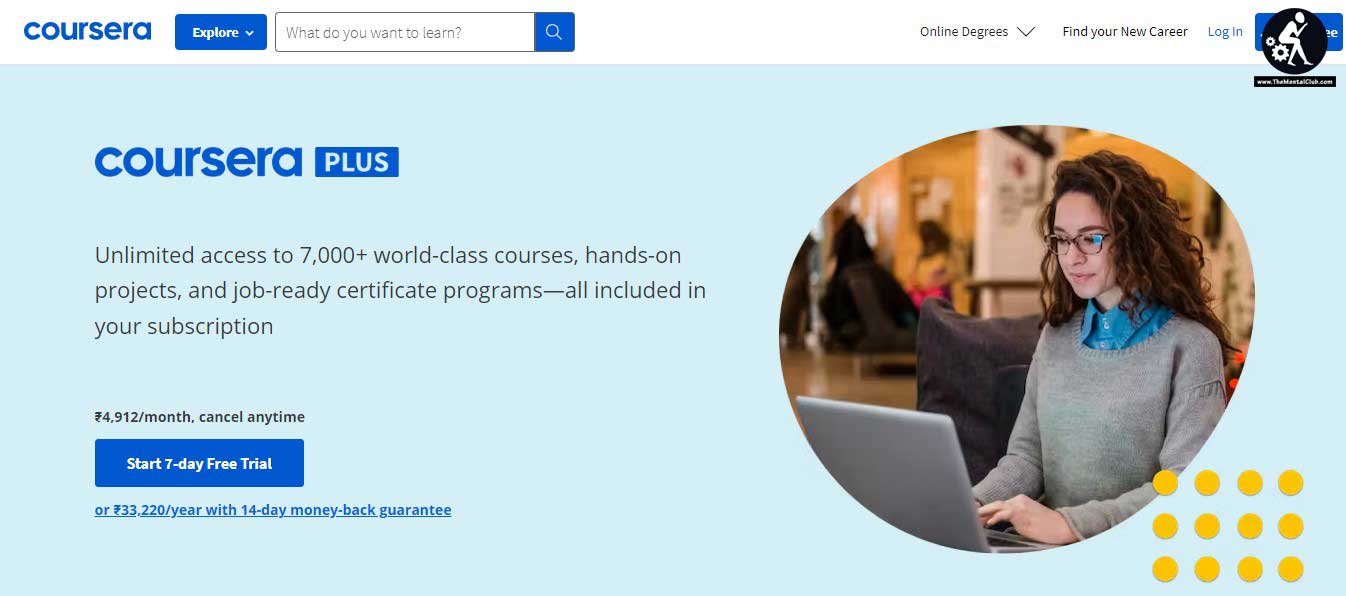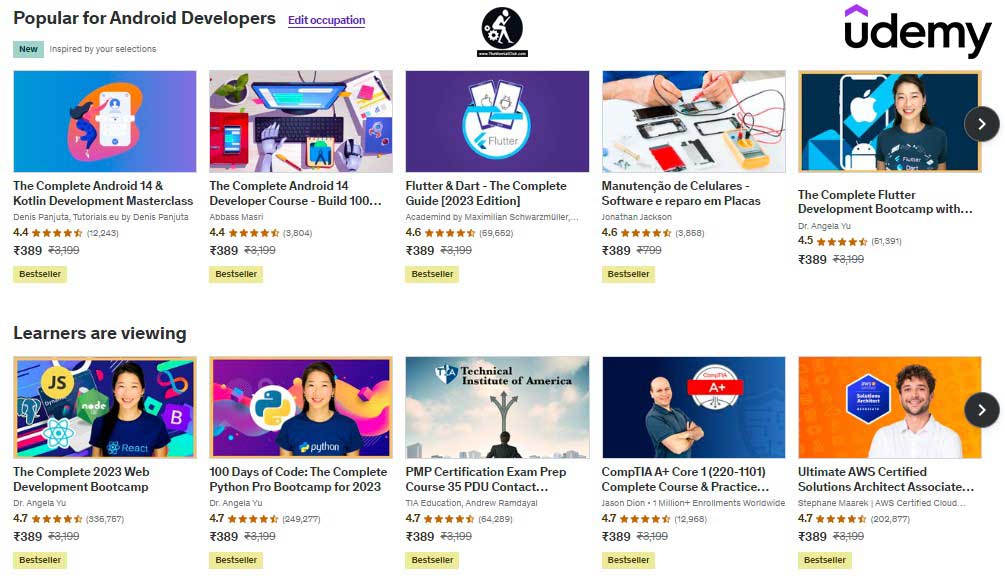The rise of online education has transformed the way we learn, develop skills, and advance our careers. With a plethora of platforms available, choosing the right one can significantly impact your learning experience and outcomes. Coursera and Udemy are two of the leading online learning platforms, each with its strengths and weaknesses. To help you make an informed decision, we present “Coursera vs Udemy: A Comprehensive Guide to Getting the Best Deals on Online Courses”, a comprehensive comparison between these two giants of online education, covering course offerings, pricing, quality, accreditation, learning experience, and more. Are you ready to discover the ideal platform for your learning journey?

Key Takeaways
- Compare Coursera and Udemy for the best deals on online courses, considering course offerings, pricing models, quality & accreditation.
- Leverage certificates from both platforms to maximize professional growth potential. Explore DontPayFull.com for savings.
- Research alternatives such as Skillshare or edX to find a suitable learning platform that meets your needs & interests.
Coursera vs Udemy: Course Offerings and Pricing
When comparing Udemy vs Coursera, it’s important to note that they cater to different learning needs and budgets with their course offerings and pricing. Coursera focuses on academic and professional subjects, partnering with leading universities to deliver high-quality courses and degree programs.
On the other hand, Udemy offers an extensive range of affordable courses, including some free courses, on various topics, from personal development to professional skills.
Course Variety and Subjects
Coursera emphasizes academic and professional education, offering over 9,000 courses across ten categories, including most courses in:
- Web development
- Business
- Computer science
- Data Science
- Humanities
These individual courses are designed and taught by experts from renowned institutions, ensuring a high level of quality and credibility.

Udemy has a large selection of over 210,000 courses, with offerings ranging from multiple topics. In comparison to other websites, this is an impressive number of choices. While not all courses on Udemy are academically focused, the platform provides ample opportunities for self-improvement and skill development. Udemy’s open marketplace approach allows individuals passionate about their knowledge to create and offer courses, resulting in a diverse range of topics and learning experiences.
However, this can result in inconsistent course quality, so it’s advisable to refer to user ratings and reviews when selecting a Udemy course. Coursera, with its strong ties to top universities, ensures a more consistent and structured academic approach, providing learners with a university-like experience.
Pricing Models and Deals
In terms of pricing, Udemy follows a pay-per-course model, with prices ranging from $11.99 to $200. This model allows learners to access courses at a lower cost and retain lifetime access to the course materials.
On the other hand, Coursera offers a mix of free and paid courses, subscriptions, and degree programs. Coursera Plus, a subscription service, provides access to 7,000+ courses, hands-on projects, and job-ready certificates at an annual cost of $399.
Although both platforms offer various pricing options, you should consider your learning objectives and budget when selecting between Coursera and Udemy.

For those seeking in-depth knowledge in specific academic or professional subjects, Coursera’s offerings may be worth the investment. However, if you’re looking to develop skills or explore new interests without breaking the bank, Udemy’s pay-per-course model may be more suitable.
Quality and Accreditation
When choosing an online learning platform, course quality and accreditation are significant factors to consider. Coursera offers the following advantages:
- Partnerships with esteemed universities and organizations to deliver high-quality courses
- Credibility and accreditation
- Average course rating of 4.7/5, indicating positive learner feedback
In contrast, Udemy’s open marketplace nature results in variable course quality, with an average rating of 4.4/5. Examining user ratings and reviews is necessary to identify quality courses on Udemy.
Udemy Course Quality
Udemy’s open marketplace allows anyone to create and offer a course, which can lead to inconsistencies in quality. User ratings and reviews are vital components of the platform. They help learners determine the quality of a course. Before enrolling in a Udemy course, it’s advisable to read reviews and check ratings to ensure a positive learning experience. While there are many high-quality courses available, some may not meet the same standards as those offered by accredited institutions like Coursera.

Despite the variability in course quality, Udemy does maintain certain requirements for course creation, such as a minimum of 30 minutes of video content and at least five distinct lectures. Additionally, the platform provides various features to enhance the learning experience, including video, audio, and text lectures, quizzes, assignments, and discussion forums. Careful evaluation of course reviews and ratings can help learners find suitable courses on Udemy that meet their learning needs and preferences.
Coursera Course Quality
Coursera’s partnership with top universities ensures a high level of course quality and accreditation. Courses are taught by experts from renowned institutions, providing credibility and a university-like learning experience. In addition to offering professional certificates and university-recognized degrees, Coursera also provides learners with the opportunity to earn academic credit for certain courses. This strong focus on academic and professional subjects makes Coursera an attractive option for learners seeking to advance their careers or deepen their knowledge in a particular field.

Coursera’s commitment to collecting user feedback and course ratings enhances the quality of its courses. The positive feedback from learners, reflected in an average rating of 4.7/5, attests to the high-quality content and teaching methods of Coursera courses. By choosing Coursera, learners can confidently invest in courses that offer a comprehensive and structured learning experience, backed by the credibility of renowned educational institutions.
Learning Experience and Platform Features
Both Coursera and Udemy offer unique learning experiences and platform features, catering to different preferences and learning styles. Both Udemy and Coursera provide a convenient and flexible learning experience, with community support and perpetual access to course materials.
In contrast, Coursera offers a more organized learning experience, featuring peer evaluations and access to course materials for a restricted period after course completion. Understanding these differences can help learners choose the platform that aligns best with their learning objectives and preferences.
Udemy Learning Experience
Udemy’s learning platform offers:
- Flexibility and convenience, allow learners to access courses at their own pace and on their preferred device.
- Course player, course settings, certificates of completion, and learning paths for a comprehensive learning experience tailored to individual needs.
- Udemy Business Pro, which provides access to labs and workspaces, further enriching the learning experience for professionals.

Community learning is another integral aspect of Udemy’s learning experience, with the platform offering a forum for instructors to connect and exchange experiences. Udemy also provides Communities of Practice, which offers curated resources and information to help learners master specific areas.
Overall, Udemy’s flexible learning experience, community support, and lifetime access to course materials make it an attractive option for learners seeking to develop new skills or explore personal interests.
Coursera Learning Experience
Coursera’s learning experience offers a more structured approach, with courses following a university-like format. Pre-recorded video lectures are typically accessed on a weekly basis, accompanied by assignments that are either auto-graded or peer-reviewed. This structured format provides a more consistent and dedicated learning experience, which can be beneficial for those seeking a deeper understanding of a particular subject.
In addition to its organized learning experience, Coursera also provides unique features such as the ability to highlight and save important parts of a video transcript, and the opportunity to earn university credit for select courses. These additional features, combined with Coursera’s strong emphasis on academic rigor and partnerships with renowned institutions, make it an appealing choice for learners seeking a more structured and academically focused learning experience.

Maximizing Savings and Discounts
Finding ways to save money on online courses can make the learning experience even more rewarding. Some tips for saving money on online courses include:
- Checking for deals and discounts on platforms like Coursera and Udemy
- Subscribing to newsletters to receive exclusive offers
- Exploring discount websites for additional savings opportunities
By utilizing these strategies, you can maximize your savings on your online learning journey.
Explore DontPayFull.com to find more discounts on online courses
DontPayFull.com is one such website that offers hand-picked coupons, promo codes, and deals for online courses, including discounts on Coursera and Udemy courses. You can find additional savings on online courses, sometimes up to 80% off, by browsing DontPayFull.com and other reliable discount websites. It’s worth exploring these websites regularly, as discounts and deals may be updated frequently, ensuring you don’t miss out on valuable savings opportunities.
Other online learning platforms, such as Skillshare, edX, and LinkedIn Learning, also offer discounts and deals on their courses. By keeping an eye on these platforms and utilizing resources like DontPayFull.com, you can maximize your savings and enjoy a cost-effective learning experience.
Leveraging Certificates for Professional Growth
Certificates from Coursera and Udemy can significantly showcase your skills and knowledge to potential employers or educational institutions. While both platforms offer certificates upon course completion, it’s crucial to understand the value and credibility of these certificates in the context of your professional growth.
Coursera certificates, backed by renowned universities and organizations, hold a higher level of credibility and can be more advantageous in both educational and professional contexts. On the other hand, Udemy’s certificates are more suitable for demonstrating skill improvements or personal development. To ensure you make the most of your online learning experience, it’s essential to consider your learning objectives and the potential impact of a certificate on your career or academic pursuits.
Coursera vs Udemy: Pros and Cons
Comparing Coursera and Udemy requires weighing the pros and cons of each platform to make a decision based on adequate information. Coursera offers academically rigorous content, the opportunity to earn degrees, and a more structured learning experience, making it an attractive option for those seeking to advance their careers or deepen their knowledge in specific subjects. On the other hand, Udemy’s wide range of courses, self-paced learning experience, and affordable pricing make it an appealing choice for learners seeking personal growth or skill development.

However, both platforms have their drawbacks. Coursera’s courses tend to be more expensive, and access to course materials is limited after course completion. Meanwhile, Udemy’s open marketplace nature can lead to inconsistencies in course quality, making it essential to rely on user ratings and reviews when choosing a course.
Ultimately, the choice between Coursera and Udemy depends on your individual learning objectives, preferences, and budget.
Tips for Choosing the Right Course
Choosing the right course on Coursera or Udemy requires consideration of several factors, including course structure, quality, learning approach, pricing, and language support. To ensure you choose a course that aligns with your learning objectives and preferences, it’s crucial to carefully review the course description, assess the learning objectives, and examine the teaching style. Additionally, analyzing reviews and ratings can provide valuable insights into the course content, quality, and overall learner experience.
Taking the time to thoroughly evaluate each course enables you to make a decision based on adequate information and select a course that meets your learning needs. Remember to consider your personal interests, career goals, and available resources when choosing between Coursera and Udemy to ensure a rewarding and fulfilling learning experience.
Coursera and Udemy Alternatives
While Coursera and Udemy are well-known online learning platforms, it’s worth considering numerous other alternatives. Platforms such as Skillshare, edX, and LinkedIn Learning offer a variety of courses and learning experiences that cater to different preferences and objectives. Exploring these alternatives can help you find the online learning platform that best aligns with your unique learning needs and goals.
Keep in mind that each platform has its strengths and weaknesses, so comparing them through research is necessary before making a decision. By considering factors such as:
- Course offerings
- Pricing
- Accreditation
- Learning experience
You can find the ideal platform to help you achieve your educational and professional objectives.
Summary
In conclusion, both Coursera and Udemy offer valuable online learning experiences, catering to different learning needs and budgets. Coursera’s focus on academic and professional subjects, partnerships with leading universities, and structured learning experience make it an attractive choice for those seeking to advance their careers or deepen their knowledge in specific fields. On the other hand, Udemy’s wide range of courses, self-paced learning experience, and affordable pricing make it an appealing option for learners seeking personal growth or skill development.
Ultimately, the choice between Coursera and Udemy depends on your individual learning objectives, preferences, and budget. By carefully evaluating course offerings, pricing, quality, and accreditation, you can make an informed decision and embark on a rewarding online learning journey that aligns with your unique needs and goals.
***Frequently Asked Questions
Are Udemy courses better than Coursera?
Udemy is an affordable platform for courses on any topic, while Coursera offers courses partnered with top universities and organizations. It depends on your specific needs as to which platform is better for you.
Is there something better than Coursera?
There are numerous online course providers available that can provide an alternative to Coursera, such as Udacity, Udemy, Codecademy, edX, DataCamp, Pluralsight Skills, LinkedIn Learning, and Udemy Business. Notably, Udemy offers 10x more courses than Coursera and also has frequent sales and promotions, making it an excellent value for money. Alternatively, edX provides online university-level courses in a wide range of disciplines, some at no charge.
Are Coursera courses worth the money?
Coursera certificates and degrees are worth the money. They provide better value than traditional college degrees, offering savings of up to 75% on overall expenses. Plus, if you’re seeking promotion or looking for a career change, a Coursera certificate has value and can be a great investment.
Is Udemy the best online learning platform?
Udemy is the perfect platform to learn a new hobby or gain knowledge in professional areas, such as Excel. It offers great value for money and should be considered when you are looking for online learning platforms.
Are Coursera courses more expensive than Udemy courses?
Overall, Coursera courses can be more expensive than Udemy courses, however some Coursera courses are free or available at reduced rates.





























